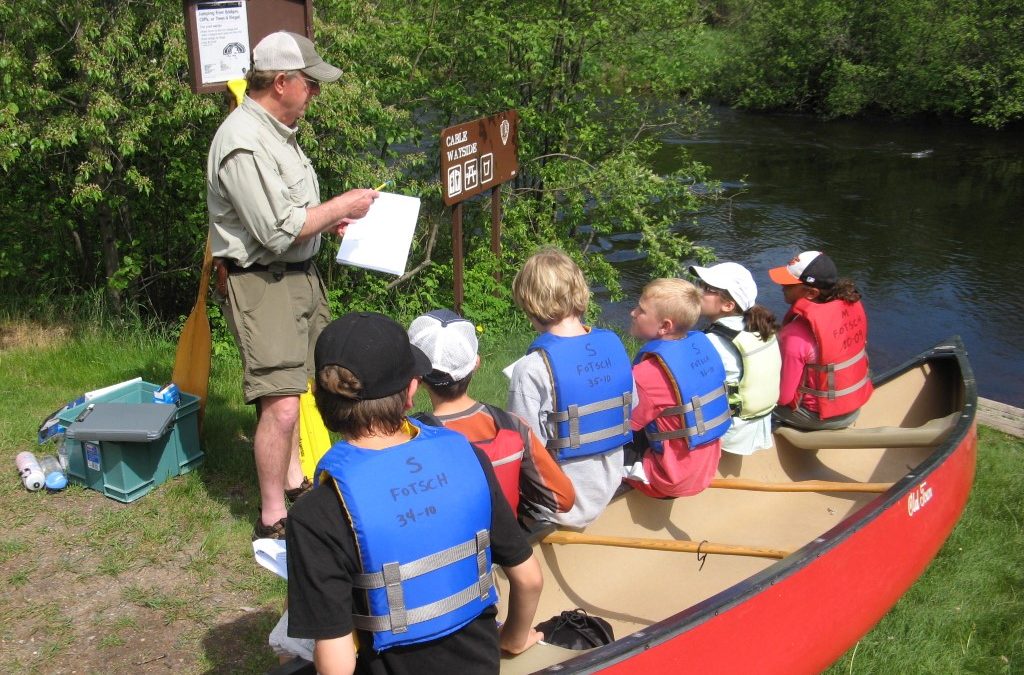
Different soil types are explored during the geology portion of the Master Naturalist training course in Cable, Wisconsin. Photo credit Emily Stone
“The goals of the Wisconsin Master Naturalist program match my own—preparing and enlisting the help of enthusiastic and trained volunteers for conservation in our communities,” says Master Naturalist Volunteer and Instructor Beth Setenfield. “The needs are great and budgets are limited. These well-informed citizens are needed now more than ever.”
Who are the Wisconsin Master Naturalists?
Master Naturalists are self-motivated individuals who participate in a 40-hour Master Naturalist Volunteer Training Course. Training combines field experiences and hands-on activities with coursework covering geology, ecology, plants, wildlife, water, aquatic life, interpretation, and human influences.
Master Naturalist Volunteer Training courses are taught by professional natural resources educators and scientists, and are held at university and college campuses, environmental education centers, nature centers and museums across the state.

During the 2015 Master Naturalist Volunteer training course participants learned about glacial history at this esker located near Cable, Wisconsin. Photo credit Emily Stone
The Cable Natural History Museum is one of the many partners offering Master Naturalist Volunteer Training.
“We’re excited to offer such a well-rounded and well-respected opportunity to our members and visitors, explains Emily Stone, naturalist and education director for Cable Natural History Museum. “With the state-wide marketing of courses, we benefit from greater exposure and new people discovering our museum and everything we have to offer.”
Once trained, Master Naturalist Volunteers provide a minimum of 40 hours of service and take eight hours of additional training annually to receive their Wisconsin Master Naturalist service pin. Volunteers recorded an impressive total of 17,300 service hours from 2013 to 2015, a value of more than $385,000 provided in our state.
“I am honored to be a part of the Wisconsin Master Naturalist Program,” says volunteer Deborah Proctor, “promoting learning about and preserving Wisconsin’s valuable outdoor resources and opportunities to enjoy what our state has to offer.”
What does a Master Naturalist Volunteer do?
Master Naturalist Volunteer service activities always relate to Wisconsin’s natural or environmental cultural history, are sponsored by an organization, occur in Wisconsin and are unpaid. Volunteer service is given in three categories including education/interpretation, citizen science, and stewardship. As citizen scientists, Master Naturalist Volunteers help to gather information to track and monitor many different species. They have helped survey bats, loons, salamanders, pollinators, deer, wolves, dragonflies, invasive species, rare plants, songbirds, and more.

This clay colored sparrow was caught in mist nets on a US Forest Service property study site for the second year in a row during Master Naturalist training. Photo credit Emily Stone
While some volunteers monitor our natural world, others serve in education and interpretation roles for audiences with a wide range of ages and interests. In addition, Master Naturalist Volunteers assist with managing lands in stewardship roles—maintaining trails and preserves and removing invasive species.
“By far our biggest benefit has been the network of knowledgeable, energetic volunteers we’ve recruited,” says Stone. “They add new interest to our program calendar, without much extra staff time. One volunteer custom painted and installed a Little Free Library on our site. Another led a cranberry treasure hunt complete with baked goods. With their enthusiasm, Master Naturalist Volunteers are excellent ambassadors for both our site and the program no matter where they go. Plus, they are fun to hang out with!”

John Kudlas, Master Naturalist Volunteer, providing instruction as part of a Critter Catching Program for youth through the Cable Natural History Museum. Photo credit Emily Stone
Blog contributed by Becky Sapper, University of Wisconsin Extension
Learn more!
Would you like to be a Wisconsin Master Naturalist Volunteer or Instructor? Wisconsin could use your help. Please check out our website and Facebook page or contact us for more information. We look forward to hearing from you!

Website: www.wimasternaturalist.org
Join us on Facebook www.facebook.com/wimasternaturalist
Email: info@wimasternaturalist.org
Call: 608 262-0200
